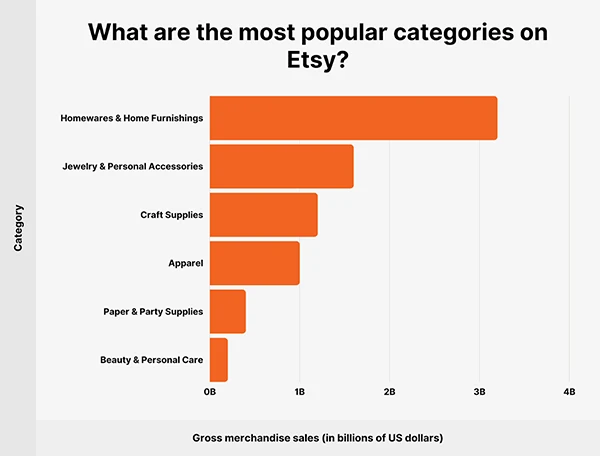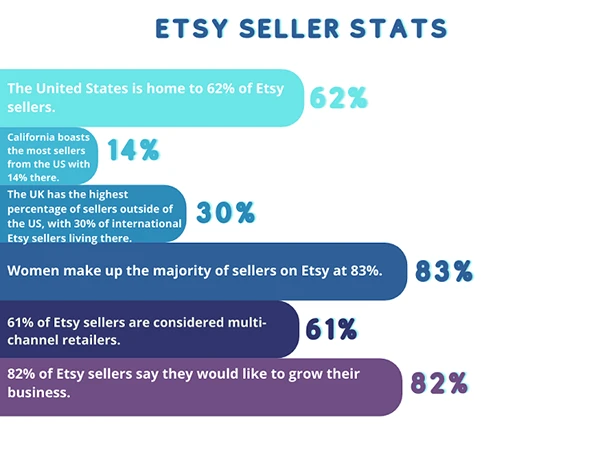Etsy is an online marketplace for creators and artisans to showcase their crafting skills. Handmade goods and vintage goods are also sold to the customers.
Setting yourself apart from other shops is a really difficult thing to do. But, you don’t need to worry as keyword research can make it easier for you.
The right keyword can increase your visibility and return rate. In this article post, we are providing you with a step-by-step guide to learn the process of Etsy keyword research. It is perfect for people who are starting their business and want to augment their sales.
Read on every step to know more!
It’s necessary to know the concept of search engine optimization (SEO) before you dive into any other concepts. Your product or item’s visibility to potential clients is ensured by a search algorithm, which ensures that your shop doesn’t get lost in the sea of listings.
For a well-calculated plan for business growth, you have to master the evaluation of rankings and listings of products. Here are the key aspects of this platform’s SEO that you should know before setting up a business.
Remember to use the relevant keywords that describe your product to stay on top of the search results. This is like an informative headline for your listings.

The above graph shows the most popular categories of products on Etsy.
Remember to use all the available slots for tags and include a combination of broad and long-tail keywords.
Ensure to provide an accurate description for every listing you do.
Try to maintain readability and clarity while describing the materials and information.
The ranking by this platform is based on various factors such as click-through rate (the percentage of people who click on your listing after seeing it in search results), conversion rate (the percentage of visitors who purchase things), and customer reviews.
Always provide accurate information and try to maintain a good reputation. A bond of trust matters in attracting potential buyers.

The data above shows the dynamics of the sellers on Etsy.
If you want to optimize your shop and catalogs, you need to understand the basic concepts of this platform’s SEO. Remember to pay attention to these points when you are crafting your items catalog to increase the chance of showing up in relevant browsed topics.
It will help you to attract potential buyers and increase the growth of your business.
Create a list of words related to your brand and think about what the people will look for that could match your brand’s features that will also help in generating business name. What product could have the same properties as yours? It requires a lot of contemplation and thinking.
For instance, if you have a shop of handmade candles, potential keywords could be “scented candles,” “soy wax candles,” or “hand-poured candles,” etc.
Do the analysis and search what other competitors are using to boost their products. Look for the things that can assist you to stand out from the others.
You will be able to get insights into the popular brands and keywords in your niche. Identify your shortcomings in choosing the tags. Make a note of the most popular tags that appear consistently in the top-performing catalogs.
Did You Know?
There are a whopping 54 million sellers on Etsy!
This platform has a feature of auto-suggestion that could be a life-changer for you.
When you start typing your brand’s keywords, you will see a dropdown list of recommended terms. These terms are based on what people usually explore.
There are various research tools that are both free and paid, these can find you a relevant and high-traffic tag for your catalogs.
Tools like Koalanda and Google’s Keyword Planner can help you with insights into search volume and competition. Besides, keyword research quality backlinks also important for website growth.
Narrow down the list once you’ve chosen the words. Try to focus on long-tail keywords (phrases with three or more words) as they are more specific.
For example, instead of just “candles,” you could use “hand-poured soy wax candles” to target a more specific audience.
Now it’s time to refine the listings after the selection of the relevant words. Include these words in your listing title, product descriptions, and tags.
Make sure to keep reader-friendly language. Avoid overloading as that can lead to bad performance of the shop and poor user experience.
The search algorithm’s nature is to evolve every day, so it would be better to stay updated and adapt to the trends. Change your strategy over time, check the performance, and make adjustments if required.
Keep your keen eye on the trends and continue to progress.
Etsy keyword research is a skill that is vital for every seller out there looking for improvement in the shop’s visibility and profits.
Follow this guide containing the instructions that will guide you toward a flourishing business.
Stay patient and remember, mastering the whole process to get noticed is a gradual one. With the correct guidance, you will be able to connect with the target audience and thrive in this business.
